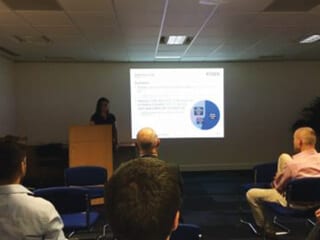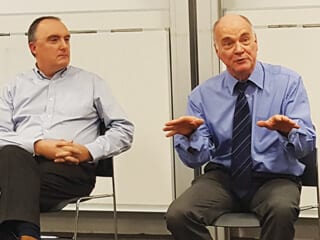
Latest News
North East Branch – The branch held its first event in 2017 on 21 February, which was hosted by ROSEN UK at its offices at Quorum Business Park, Newcastle upon Tyne. About 20 people attended the event and had an opportunity to learn about Flow Modelling and Flow Assurance through two presentations.
The first presentation, titled “Introduction to Flow modelling and Flow Assurance in Oil and Gas Industry” was delivered by a senior flow assurance engineer at ROSEN UK, Mr. Ashwin Pinto. His presentation discussed the basic concepts and methodology behind the
flow assurance, whilst also highlighting advantages of undertaking flow analyses to better understand performance of production systems, optimize oil and gas operations, and improve system designs.
The second presentation was given by Marguerite Forde, a senior engineer at ROSEN UK, entitled “Optimization and Validation of Internal Corrosion Direct Assessment – Prediction vs. Reality”. Ms Forde presented a case study focused on (i) demonstrating the accuracy of predicted corrosion rates vs. those rates experienced by pipeline assets in reality and (ii) utilization of available direct inspection results to fine-tune corrosion models to predict the condition of sections of the pipeline which cannot be inspected directly.
This year, the branch will hold a summer event on 6th July 2016 at Hatfield College, Durham University, when Professor Jon Glyuas, Durham University, will give a presentation on “Energy past, present and future”. The talk will examine the national picture for energy supply and demand, identify the risks, and then comment on what the UK can do to improve its energy security in the long term.
The evening starts at 17.00, with a tour of Durham Castle at 17.30, followed by the presentation, and a buffet and drinks from 19.30, together with time for networking. The costs are £5 for members and the first 10 students registered, and £10 for non-members. A Registration form will be available on the ICorr website, and as there are limited spaces, early booking is advised.

Latest News
London Branch – The Branch began the New Year by welcoming the “Three Wise Men”, Alan Denny, AKD Materials Consulting, Bill Hedges, BP, Corrosion Engineering Technical Authority and Steve Paterson, Shell (Amsterdam), Principal Technical Expert Upstream Materials, who gave a presentation entitled ‘The Past, Present and Future of Corrosion’.
Alan Denney illustrated his past experience with numerous and far reaching projects and corrosion problems, including reinforcement corrosion in buildings, graphitic corrosion of cast iron, the use and misuse of Cor-Ten steel, the use of duplex stainless steels in architectural demanding buildings together with a number of issues in the oil and gas industry. Bill Hedges then looked at what the corrosion industry was doing well, such as technical development, networking and training, risk assessments, corrosion modelling, effective corrosion barriers and management systems. He then stated that opportunities for improvement existed in, attracting the next generation of engineers, project cost control, corrosion monitoring and inspection, sharing of knowledge across the industry, and the adoption of common standards. Steve Paterson detailed key future challenges including an ageing infrastructure, marginal field development, dealing with high pressures and temperatures, extreme environmental conditions, materials for sustainable energy together with the development of artificial intelligence, commercial acumen and a greater awareness of risk/probability.
Following the presentations, the 45+ attendees participated in a question and answer session which particularly discussed the way to attract young people into the industry who will be innovative and creative and use good judgement in the use of corrosion protection. On 9th February, the Branch met to enjoy a technical presentation entitled ‘Corrosion Inhibitor Testing – The Journey’ given by George Winning; corrosion specialist for Element Materials Technology.
George began his presentation with a quick review of the 70 year history and development of chemical products, the study of the inhibitor mechanisms, together with some of the key characteristics an inhibitor should have, to ensure that they will work for a particular oil and gas system. The presentation looked at the many tests that are needed to be carried out to identify the correct product for a system, and how a set of tests may vary between an application in low oil cut systems through to high water cut systems, and the different tests required for gas systems. George made particular reference to the problems associated with the effects of flow, the difficulty of achieving full inhibition where ‘under deposit corrosion’ (UDC) is occurring, the problem in combating ‘preferential weld corrosion’ (PWC) and the specific techniques required to combat ‘top of line corrosion’ (TOLC).
He then summarised ‘The Journey’ to be made for success, including review of the application, design of the test program, the selection of performance tests, field testing, re-evaluation and performance monitoring. After negotiating a question and answer session with the attendees, Committee Member, Polina Zabelina thanked George for his comprehensive review on all that needs to be considered, and invited all present to enjoy the traditional hospitality of the London Branch.
Details of forthcoming Branch technical meetings can be found on the ICorr website and in the Diary Date page of Corrosion Management, and are held at Imperial College Skempton Building, at 18.00 for an 18.30 start. Enquiries can also be sent to icorrlondon@gmail.com

Latest News
It is with great pleasure that I am able to write to you in my new role as President of the Institute. I would like to express my thanks to John Fletcher and the whole steering committee for their hard work and time they have dedicated over the past two years, as they hand over the reins.
As an organisation, we are entering a period of change as we are faced with continued pressures and challenges in the world around us, but it is a challenge we are facing head-on. I hope to attend local branch meetings as much as possible, and look forward to more collaboration between the branches and headquarters.
Over the next two years I intend to continue the good work already started to deliver added value to our members, grow our network and membership numbers. Chris Bridge has been elected as the Young ICorr representative, and will be the focus for the younger members. Other initiatives such as the joint working group with the Marine Corrosion Forum will begin to solidify, and I encourage participation by all members in any activity they can, to bring people into the world of corrosion.
We are a members-driven organisation, and we genuinely value your thoughts and ideas, and I ask that you contact me at any time to share these. A steering group has been set-up to look at the “road to Chartership”, and I will keep you up-dated with the progress on this, and other matters. You will start to see more visible changes in the website and this publication, which I hope you will see benefit in.
Thank you for your continued support of the Institute, and I look forward to working with you all.
Sarah Vasey,
President – The Institute of Corrosion

